The problem with America’s military in Africa
By Brian E. Muhammad -Staff Writer- | Last updated: Apr 26, 2018 - 1:05:00 PMWhat's your opinion on this article?
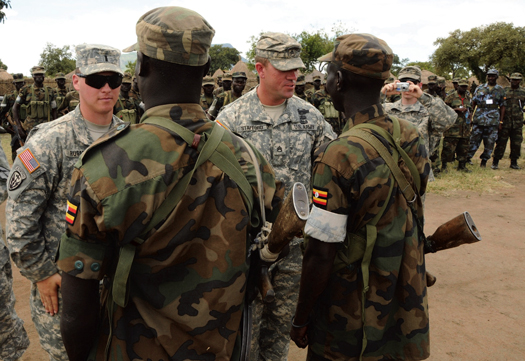
In this April 20, 2011 file photo, U.S. Army soldiers are seen with Uganda People’s Defense Force soldiers at the closing ceremony for operation ATLAS DROP 11, an annual joint aerial delivery exercise, in Soroti, about 400 kilometers east of Uganda’s capital city Kampala. The United States is providing intelligence and training to fight militants across the continent, from Mauritania in the west along the Atlantic Ocean, to Somalia in the east along the Indian Ocean
|
Experts say there are assorted reasons why the United States military is in Africa. Everything from fighting terror and extremism to capacity training of African armies, humanitarian aid as well as supporting longtime geopolitical allies are cited as reasons for American involvement in the Motherland.
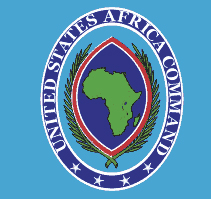
|
However noble some of these reasons sound, the U.S. has a sordid history that includes imperialism and internal meddling in Africa, say those who question the American military presence.
Officially the U.S. maintains only one military base in Africa, in the small country of Djibouti, but is involved in countries across the continent. The central command for the U.S. military stamp on Africa is AFRICOM which began a decade ago under the George W. Bush administration. It is headquartered in Germany.
—NEWS ANALYSIS—
“The United States has historically been involved in the continent,” said Dr. Amy Pate, research director at the National Consortium for the Study of Terrorism and Responses to Terrorism.
During the Cold War years with the old Soviet Union, U.S. involvement in Africa was motivated, in part, out of competition with the Communist nation Soviet Union, now it’s driven by strategic competition mainly with China, she said.
“So, it’s more economic, whereas during the Cold War it was more ideological,” Dr. Pate told The Final Call.
The increased focus on Africa by world powers comes amid a time of economic trouble and decline for America and its Western counterparts.
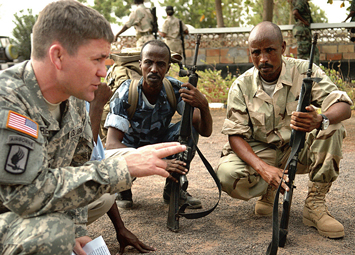
Army Pfc. Daniel Baetson, deployed to Camp Lemonnier, Djibouti, serves as a mentor with Combined Joint Task Force Horn of Africa to help African partners build niche capabilities such as logistics, legal affairs and medicine, Aug. 6, 2009.
|
The U.S. is trailing in the business competition with China and finds its advantage on the world stage in its military might, said Dr. Gerald Horne, University of Houston professor of history and African American studies.
“The United States feels—perhaps correctly— that it cannot compete financially and economically with China, particularly in light of China’s one belt, one road initiative, which among other things is going to build up infrastructure in Africa,” said Dr. Horne.
The initiative is a project pushed by Chinese President Xi Jinping who has made significant trade deals in Africa. The “one road” objective is to build trade routes between China and Central Asia, Europe and Indo-Pacific countries. The “one belt” is a waterway, network oil pipelines, power grids, ports and other infrastructure projects meant to connect China to the world.
However, with its massive military budget that grew under President Donald Trump, the U.S. is more confident in its military might. “That’s the card that it’s playing; the military card,” said Dr. Horne.
The U.S. outspends China militarily and as the number one purveyor of weapons and military technology globally, America is in demand by governments, including in Africa.
“It’s an added benefit, from Washington’s point of view, that it allows the United States to get closer to the military in other countries,” Dr. Horne said.
Brian Becker, national coordinator of ANSWER (Act Now to End War and Racism Coalition) added that with the establishment of AFRICOM, America is setting the stage with its influence.
He believes the United States recognizes that China and other major global powers are establishing economic ties with African nations. “The U.S. is in fact involved in a scramble or a competition for domination over Africa,” he said.
Mr. Becker doesn’t believe China is attempting to dominate Africa and China’s economic interaction with African countries— while fl awed—is fundamentally different than the relationship between Western capitalist corporations and Africa.
“But, the U.S. sees that if African countries are developing their own economic bilateral relations with other major powers, that negates the prospects or possibility of the U.S. having unipolar domination,” he said.
America is also competing with France, a former colonial power, which has pursued an aggressive military policy in its former African colonies over the last decade, said analysts. They say the current moves by America and Western powers is a reminder of the fi rst scramble for Africa from the late 1800s to the early 1900s. “Likewise, here we are 150 years later, and the scramble is on once again,” Mr. Becker pointed out.
In recent months the U.S. held military exercises with African militaries in Senegal, Niger and several African countries. In March, the U.S. government signed a Defense Cooperation Agreement with Ghana in West Africa, which drew widespread criticism, condemnation and street demonstrations.
The implication is if a government is moving in a direction that Washington disapproves of, America can influence its connection to the military and facilitate a coup d’état, Dr. Horne argued.
These fears are not unfounded considering America’s checkered past in Africa over the last 60 years. The U.S. Central Intelligence Agency orchestrated internal strife and discord toward destabilizing African nations and propping up puppet regimes beholden to it.
The partnership with African states allows U.S. Special Forces to routinely come into African countries. Consequently, Mr. Becker explained, the U.S. will have more of an influence under such an arrangement.
“Wherever American troops or military bases are located; that is a fundamental negation of sovereignty for the government that is hosting these bases,” said Mr. Becker.
America marginalizing the sovereignty of other nations has been its modus operandi worldwide. The U.S. has used its military might to assert her interests on others.
“AFRICOM arrogates to itself the right to carry out military operations of all types—not just on the ground—but especially using air forces and drone technology,” Mr. Becker observed.
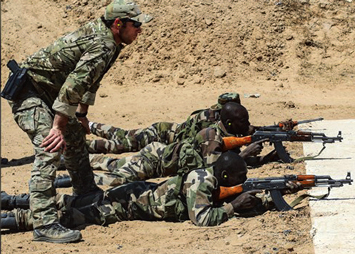
A U.S. Army Special Forces weapons sergeant observes a Niger Army soldier during marksmanship training as part of Exercise Flintlock 2017 in Diffa, Niger.
|
The U.S. government maintains its “partnering” with African nations in a war on terror and militant extremism. The problem has been rising in Africa as other battlegrounds have been diminishing for extremist groups, officials contend.
“Terrorism is not necessarily new to Africa,” said Dr. Pate. However, she explained, the U.S. took keener interest in working with governments to counter terror groups when more localized movements began linking up with global networks that espoused anti- U.S. ideologies.
Countering extremism in Africa was only a concern when the problem was no longer local, she said.
“At best, I think you can consider that rationale to be incoherent … it’s akin to trying to ride two different horses going in different directions at the same time,” Dr. Horne said.
“For example, in Libya, the United States overthrew the Gadhafi regime which was fighting religious zealotry and by overthrowing Gadhafi , the United States helped to strengthen religious zealotry … and strengthen so-called terrorism.”
Dr. Horne said in some ways the U.S. is enabling the same forces it claims to be fighting.
Some observers of African affairs say Africans should solve problems besetting Africa and discourage foreign militaries. Along with regional governmental bodies, there is the continentwide African Union representing all 54 nations.
The AU, however, is in a precarious position, said Dr. Horne. “They depend upon financing from the international community, which includes the United States of America,” he said.
“Therefore, it’s not, from their point of view, diplomatic or tactful to be in the forefront criticizing the United States on the one hand and then seeking funding for their peacekeeping on the other hand.”
It was predicted in a June 2011 Final Call article that if the Libyan leader was eliminated and the U.S.-NATO coalition won, it would strengthen the hand of outsiders in Africa but result in setback for the continent.
Britain, France and the United States bombed Libya in 2011. In every instance in the 21st century the colonialists and imperialists are once again invading, occupying the Middle East and Africa and assigning their military incursions noble causes. For Libya it was to “protect civilians” under a United Nations resolution.
“Of-course that turned out to be a lie, it was for regime change,” said Mr. Becker.
Libya was targeted because it possessed huge oil reserves and Mr. Gadhafi nationalized Western corporations, using the wealth of his country to support a united Africa that would not be a foreign geostrategic playground.
The destruction of Libya was an accelerant for old colonial powers using militarism, invasion, bombing, and occupation to reassert control over Africa.
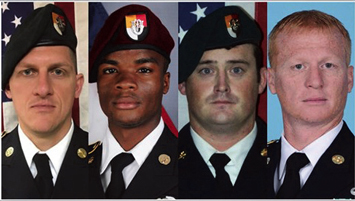
From left, Staff Sgt. Bryan C. Black, 35 of Puyallup, Wash.; Sgt. La David Johnson, 25, of Miami Gardens, Fla.; Staff Sgt. Dustin M. Wright, 29, of Lyons, Ga. and Staff Sgt. Jeremiah W. Johnson, 39 of Springboro, Ohio. All four were killed in Niger, when a joint patrol of American and Niger forces was ambushed on Oct. 4, 2017, by militants believed linked to the Islamic State group.
|
The incident happened amid changes in the U.S. National Security policy. “Despite the defeat of ISIS’s physical caliphate, threats to stability remain as terrorist groups with long reach continue to murder the innocent and threaten peace more broadly,” said a Defense Dept. report on its website.
“It’s clear that the U.S. government is using the issue of terrorism or more specifically the purported fight against terrorism as a pretext for major expansion of the U.S. military footprint throughout Africa,” said Mr. Becker.
INSIDE STORIES AND REVIEWS
-
-
About Harriett ... and the Negro Hollywood Road Show
By Rabiah Muhammad, Guest Columnist » Full Story -
Skepticism greets Jay-Z, NFL talk of inspiring change
By Bryan 18X Crawford and Richard B. Muhammad The Final Call Newspaper @TheFinalCall » Full Story -
The painful problem of Black girls and suicide
By Charlene Muhammad -National Correspondent- » Full Story -
Exploitation of Innocence - Report: Perceptions, policies hurting Black girls
By Charlene Muhammad -National Correspondent- » Full Story -
Big Ballin: Big ideas fuel a father’s Big Baller Brand and brash business sense
By Bryan Crawford -Contributing Writer- » Full Story






 Click Here Stay Connected!
Click Here Stay Connected!








